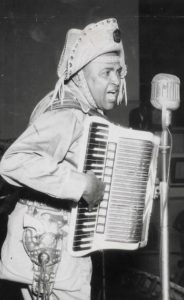
Luiz Gonzaga
*Luiz Gonzaga was born on this date in 1912. He was an Afro Brazilian singer, songwriter, musician, and poet.
The son of a farmer, Luiz Gonzaga do Nascimento, was born in Recife, Brazil. He was very early attracted to the accordion and used to accompany his father at parties and religious celebrations. He later went to do his military service, where he learned to play the cornet. After leaving the army, he remained in Rio de Janeiro, performing in the streets and bars.
After noticing that the northeastern people living in Rio de Janeiro missed the music from their home states, he started to give listeners the sort of music they craved to hear: xaxados, baiões, chamegos, and cocos. After discovering this niche in the market, Gonzaga became a regular at radio shows and started making records. In 1943, in typical northeastern costumes, for the first time to perform live and play popular songs on the accordion, he began to sing his material.
His most significant hit ever, "Asa Branca," was recorded in 1947 and covered countless times by many artists. He worked on the radio until 1954, enjoying huge popularity. He is widely recognized for taking the baião style and the accordion to a wide audience. During the 1960s, he became increasingly stranded on big city stages, so he toured the countryside. In the 1970s and 1980s, he slowly re-emerged, partly due to the covers of his songs by artists like Gilberto Gil and Milton Nascimento. He has been credited with presenting the rich Northeastern musical genres to Brazil.
Gonzaga received the Shell Prize for Brazilian Popular Music in 1984. The Luiz Gonzaga Dam was named in his honor. His son, Luiz Gonzaga do Nascimento Jr, was a noted Brazilian singer and composer. The surname Gonzaga is an ancient noble surname in Brazil, Portugal, and Italy. Luiz Gonzaga died of natural causes on August 2, 1989, at 76.